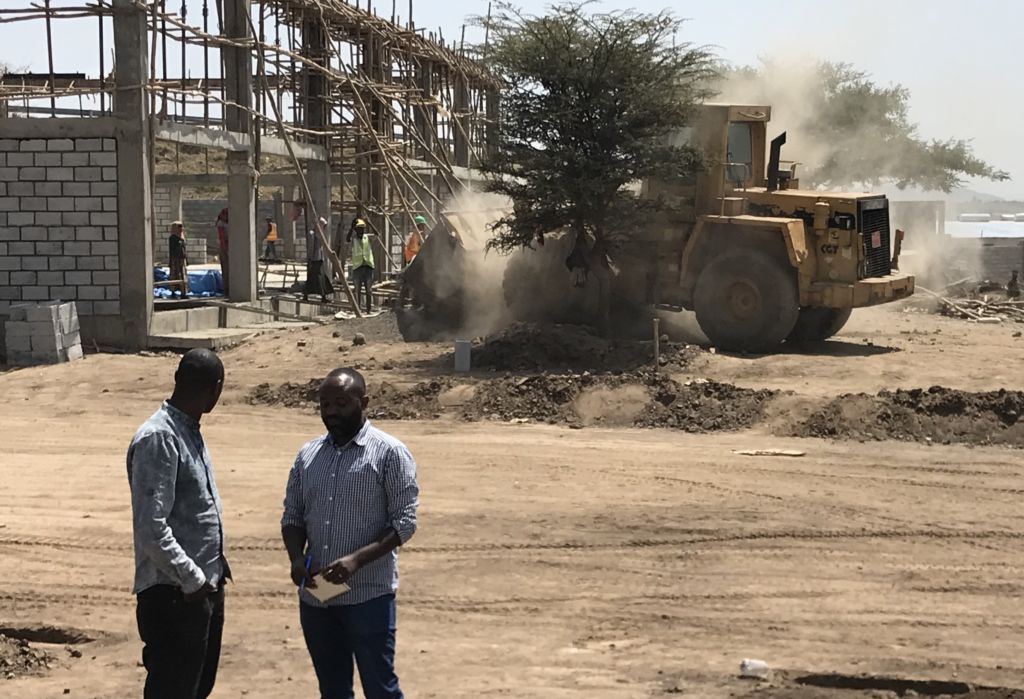
Ethiopia’s first medical waste incinerator facility under construction outside Addis Ababa.
A group of business leaders are partnering with the William Davidson Institute to find both financially and ecologically sustainable solutions to Ethiopia’s medical waste problem.
While Ethiopia has official directives that mandate the proper and timely disposal of medical waste, enforcement often has been challenging. This has resulted in warehouses full of expired pharmaceuticals along with biomedical waste generated by hospitals and other healthcare facilities. The Ethiopian government recently decided to address the pharmaceutical waste problem and is looking for a company from the private sector to be part of a Public-Private Partnership (PPP).
The government has started building its first medical waste incinerator facility outside the capital city of Addis Ababa to burn expired pills, and has committed to building seven more around the country. A group of business managers led by Mel Negussie and Tamrat Bekele are interested in managing the business aspects of operating the incinerators and have asked WDI to help them think through the business plan.
Through the work of WDI staff, including Claire Hogikyan, vice president of administration and publishing at WDI, and a team of Weekend MBA students, WDI is developing a proposal to be presented to the government later this year. The proposal will include analysis on several aspects of the incinerator project, including estimating costs, pricing and a plan to scale it. The plan will include an autoclave facility in Addis Ababa that would handle a buildup of biomedical waste from surrounding healthcare facilities, another challenge the Ethiopian government is trying to address.
The idea for an autoclave facility came after Hogikyan traveled to Ethiopia in fall 2018 on a fact-finding mission. At the end of her week-long visit, Hogikyan thought Negussie and his group needed to go in a different direction. While many expired pharmaceuticals can be incinerated, many cannot. For example, medications that are toxic or items such as inhalers that would explode when burned can not be incinerated. Additionally, there are ongoing environmental concerns that accompany incineration.
Most U.S. hospitals, including at the University of Michigan, use an autoclave to properly dispose of expired pharmaceuticals as well as biomedical waste. An autoclave uses heat to disinfect the material and a grinder -similar to a kitchen sink disposal system enlarged and turned on its side. The disinfected and ground material is spit out onto a conveyor belt where a pulverizer breaks down the material further into indistinguishable components. The remaining waste is then dumped into plastic barrels which are shipped to a landfill and buried.
“An autoclave would improve the environment,” Negussie said. “Addis is growing. It is also becoming polluted. Every hospital burning their own medical waste isn’t going to help. An autoclave is a green solution.”
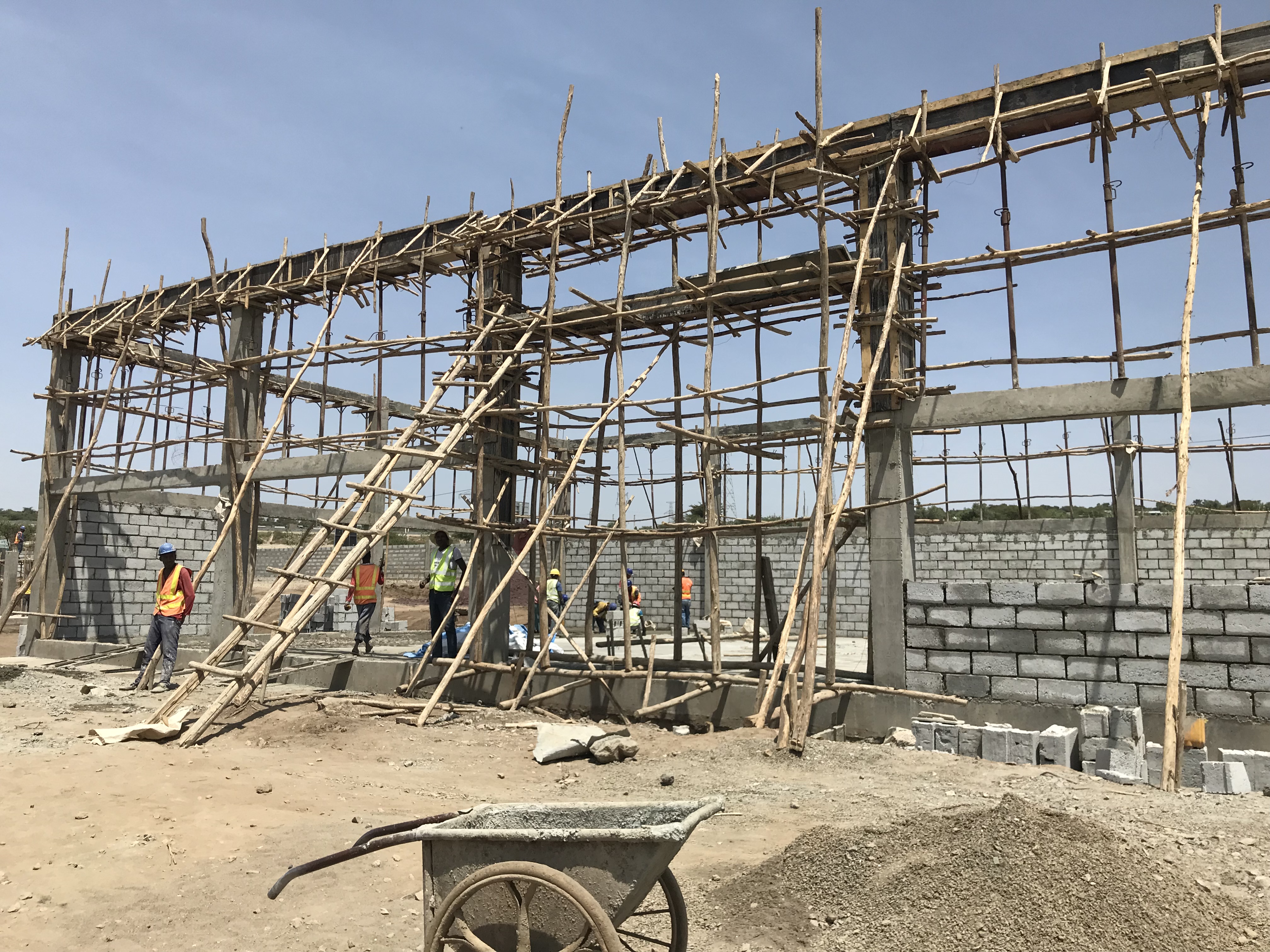
Negussie also is member of Ethio-American Doctors Group (EADG), a group of more than 250 Western-trained clinicians who have committed time and money toward the development of a world-class tertiary care hospital in Addis Ababa. WDI has worked with EADG since 2014 on the governance of the hospital, capital equipment planning, nurse training and a financial model.
When he and his partners began thinking about the incineration project, he reached out to WDI for assistance. He and his partners have operational and project management experience, he said, but needed WDI to strategize with them, to shape a business plan and provide a roadmap to profitability.
“We need someone to help us think through business concepts from capital expenditures, the ownership, the management, the logistics in terms of how it connects,” Negussie said. “What is the proper way of disposing it? What are the other options? Someone to really do the business plan on the business services. That’s not something we can do.”
The businessmen expect to submit proposals to the Ethiopian government this spring to operate the incinerators and also open an autoclave facility. Negussie said he hopes to have an autoclave in the capital city up and running by fall 2019.
WDI President Paul Clyde said the Ethiopian partnership is a great fit for the Institute. He said Negussie and his partner, Tamrat Bekele, are smart businessmen trying to build a model to solve a problem that hasn’t been addressed by a profitable business in the past.
“Working with them to develop something in medical waste gives us a model that we can take to other countries and work with other partners to develop similar businesses,” Clyde said. “Medical waste is an area that hasn’t received the attention it needs in many countries, but we can expect that to change in the coming years as businesses begin to play a more important role in filling that gap.”
Tom Light, managing director of WaterEquity and a recent guest of the WDI Global Impact Speaker Series, sat down for a one-on-one video interview while on campus. (Watch the discussion below.)
Light, who was interviewed by Pascale Leroueil, vice president of WDI’s Healthcare initiative, talked about a number of aspects of WaterEquity, which is the first-ever impact investment management firm with an exclusive focus on ending the global water crisis. Those included how the organization operates, how blended finance fits into the strategy, the biggest advantage to working with the private sector and where Light sees WaterEquity in 10 years.
WaterEquity’s experience in water and sanitation investment opportunities in low- and middle-income countries guide its investment strategies that drive both sustainable financial returns and social impact. By investing in enterprises operating in impoverished communities, WaterEquity’s investments help these enterprises scale up, meet increasing market demand and deliver universal access to clean, safe water and sanitation, the fund notes.
WaterEquity was established by Water.org, the charity co-founded by actor Matt Damon, to mobilize capital for water and sanitation enterprises serving the needs of poor people. Last month, WaterEquity announced the first close of its US $50 million flagship fund—WaterCredit Investment Fund 3 (WCIF3)—at US $33 million. Investors included Bank of America, the Overseas Private Investment Corporation (OPIC), Ceniarth LLC, Niagara Bottling, as well as the Conrad N. Hilton, Skoll, and Osprey Foundations. A second-close is projected before the end of the year.
Light oversees all aspects of the business including strategy, operations and expansion. He has more than 18 years of experience in public and private capital markets in the areas of investment management, investment banking and fund development. Previously, Light led Grameen Foundation’s impact investing strategy serving first as a fund manager and then as the Head of the Capital Management & Advisory Center.
He received his B.A with honors from the University of Michigan in Quantitative Economics, holds an MBA in Finance from the Wharton School at the University of Pennsylvania and is a chartered financial analyst.
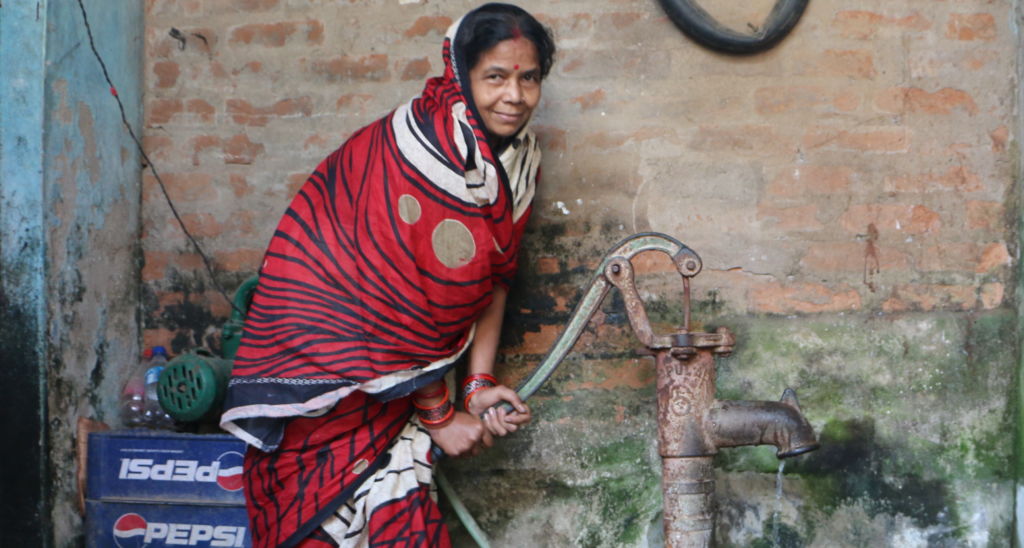
Tom Light, managing director of WaterEquity, the first-ever impact investment management firm with an exclusive focus on ending the global water crisis, is scheduled to be the next guest for the WDI Global Impact Speaker Series.
Light’s talk, “Liquid Assets: Investing to End the Global Water Crisis,” will begin at 5 p.m. on Nov. 27 in room R2240 at the University of Michigan’s Ross School of Business. It is free and open to the public.

WaterEquity’s commitment to, and knowledge of, water and sanitation investment opportunities in low- and middle-income countries guide its investment strategies that drive both sustainable financial returns and social impact. By investing in enterprises operating in impoverished communities, WaterEquity’s investments help these enterprises scale up, meet increasing market demand and deliver universal access to clean, safe water and sanitation, the fund notes.
WaterEquity was established by Water.org, the charity co-founded by actor Matt Damon, to mobilize capital for water and sanitation enterprises serving the needs of poor people. Last month, WaterEquity announced the first close of its US $50 million flagship fund—WaterCredit Investment Fund 3 (WCIF3)—at US $33 million. Investors included Bank of America, the Overseas Private Investment Corporation (OPIC), Ceniarth LLC, Niagara Bottling, as well as the Conrad N. Hilton, Skoll, and Osprey Foundations. A second-close is projected before the end of the year.
As the first-ever impact investment fund manager with an exclusive focus on ending the global water crisis, WaterEquity transforms how capital markets work in order to finance the United Nations’ Sustainable Development Goals (SDGs). With annual investments in the SDGs totaling $1.4 trillion and their attainment estimated at $3.9 trillion per year, WaterEquity offers a critical solution to bridge the $2.5 trillion annual investment gap. By supporting the sustainable growth of water and sanitation enterprises in emerging markets, WaterEquity represents an unprecedented opportunity to end the global water and sanitation crisis for hundreds of millions of men, women, and children.
Light oversees all aspects of the business including strategy, operations and expansion. He has more than 18 years of experience in public and private capital markets in the areas of investment management, investment banking and fund development.
Previously, Light led Grameen Foundation’s impact investing strategy serving first as a fund manager and then as the Head of the Capital Management & Advisory Center. Prior to that, Light held executive-level positions in investment banking at UBS AG and in the nonprofit sector at the Clinton Health Access Initiative. He received his B.A with honors from the University of Michigan in Quantitative Economics, holds an MBA in Finance from the Wharton School at the University of Pennsylvania, and is a chartered financial analyst.
Learn more about WaterEquity in this article from WDI-affiliated site, NextBillion.net: “How Water.org ‘Took a Leap of Faith’ into Social Impact Investing.”
Photos courtesy of water.org
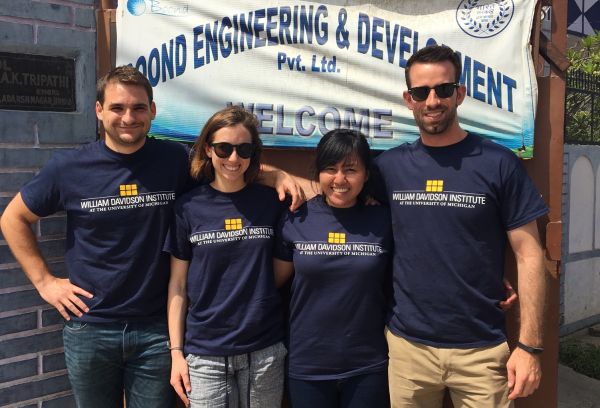
As their 2017 MAP project, U-M students Florian Eizaguirre, Amelia Harris, Matilda Narulita and Chris Atkins are advising Boond, a renewable energy firm in India.
Tom Reidy’s previous work experience and core MBA classes this year at U-M’s Ross School of Business have focused on operating a business in the developed world. That’s one reason Reidy is excited to head to South Africa to work for the startup organization, Mbuyu, as part of the school’s annual Multidisciplinary Action Projects (MAP).
“I’m interested in learning how business strategy differs in low-income, or base of the pyramid, markets because the frameworks we learned in our core classes over the last year have focused on developed markets,” said Reidy, a first-year MBA student. “Also, this will be my first time working with a start-up and dealing with impact investing, so I’m hoping to achieve a good understanding of how those things function.”
Mbuyu is working with South African National Parks to protect some of the world’s most critical honey bee ecosystems while developing a business to produce and sell organic honey. The MAP in South Africa is one of 11 student projects organized and sponsored by WDI. The Institute also is providing funding for two additional MAP projects.
MAP is an action-based learning course offered at Ross in which MBA students receive guidance from faculty advisors. Each project requires analytical rigor, critical thinking, and teamwork. Participating organizations receive top-notch deliverables and data-driven recommendations from the teams of students. (Find out more about WDI’s MAP projects over the years here.)
After learning about their projects and conducting secondary research for several weeks, the students then spend two to four weeks working with their organizations in the field.
Carissa De Young, a second-year MBA who is a dual degree student at Ross and the School of Natural Resources, will travel to India with her MAP team to work for GE Power.
“I’m most looking forward to learning more about the challenges in rural areas and how large companies can use their expertise to provide solutions,” she said.
Below is a summary of each WDI-sponsored MAP project.
African Institute of Management (IAM) – Senegal
Advised By: Paul Clyde, WDI and Ross School of Business
Team Members: Paul Miyamoto, Kaitlyn Fischer, Bradley Rollins
Founded in 1996, the Institut Africain de Management Group (IAM) is one of the leading private business schools in Central and West Africa. IAM is developing a master’s degree program in supply chain. This program will address the needs in Senegal and West Africa generally, by increasing the supply chain management talent available in the region.
The goal of this project is to develop a market entry strategy for a supply chain program at IAM. The team will learn about the program and then conduct competitive analysis and interview businesses that either are or employ potential customers in Senegal.
Aparajitha Foundation – India
Advised By: Paul Clyde, WDI and Ross School of Business; Bob Dittmar, Ross School of Business
Team Members: Diocelyn Batista Rijo, Rachel De Leon, Adam Fitzmaurice, Nancy McDermott
The Aparajitha Foundation is an arm of the Aparajitha Group. It is committed to the cause of creating transformational change in adolescents by using audiovisual technology to deliver life skills training to economically disadvantaged children in India’s Tamil Nadu state.
The MAP team will conduct a market analysis that will enable the creation of a financial model for an overarching ecosystem to support the micro small medium entrepreneurs (MSME) sector in Madurai, India.
Aravind Eye Care System – India
Advised By: Paul Clyde, WDI and Ross School of Business; Thomas Buchmueller, Ross School of Business
Team Members: Kaitie Conrad, Nikita Jambulingam, Siddhi Kaul, Ravi Patel
Aravind Eye Care System is a network of hospitals, clinics, community outreach efforts, factories, and research and training institutes in south India that has treated more than 32 million patients and has performed 4 million surgeries since its 1976 founding.
The student team will work with Aravind’s senior leadership to develop a roadmap for the eyecare system’s future growth.
Banyan Global – Ghana
Advised By: Ted London, WDI and Ross School of Business; Jim Walsh, Ross School of Business
Team Members: Vagisha Goel, Eric Perrin, Adi Singhal, Courtney Tatum
Banyan Global is a development consulting firm that works in five continents. It is implementing a USAID-funded project to increase access, improve efficiencies and expand quality maternal-child healthcare in rural areas. Banyan is working with private maternity home owners who may be nearing retirement on “transformation” options – selling the facility, leasing out the facility, bringing on a partner, bringing on a manager, or bringing on a specialist who will enable the facility to diversify its service offerings.
The MAP team will focus on an in-depth investigation into the the financial constraints and opportunities for private maternity homes in Ghana, with a specific focus on the projected return on specific potential investments, and the feasibility of various credit options to finance those investments.
Boond Engineering & Development – India
Advised By: Ted London, WDI and Ross School of Business; Jane Dutton, Ross School of Business
Team Members: Chris Atkins, Florian Eizaguirre, Amelia Harris, Matilda Narulita
The students will build a strategy around data collection and analysis and finding ways to monetize it. Boond collects a lot of consumer demographic data along with energy usage data from its portfolio of micro-grids in rural communities. It wants to analyze the data and explore ways of sharing its findings to those interested for a price.
CARE International – Egypt
Advised By: Ted London, WDI and Ross School of Business; Jane Dutton, Ross School of Business
Team Members: Andrew Hauser, Colleen Hill, Zack Molnar, Elizabeth Padilla
Working with the Danone Ecosystem Fund, CARE International is working to improve the socio-economic conditions of dairy farmers in Egypt using a collaborative model that engages cooperatives and community development associations in the country.
The MAP students will partner with Danone and CARE International to facilitate access to quality information for dairy farmers to improve their skills and productivity, and develop the institutional capacity, including good governance practices of farmers’ organizations.
GE Power – India
Advised By: Ted London, WDI and Ross School of Business; Sugato Bhattacharyya, Ross School of Business
Team Members: John Barbour, Carissa De Young, Claire Fletcher, Wiles Kase, Christina Lee, Jon McCartney
GE Power provides power generation, energy delivery, and water process technologies to solve issues in local markets.
The student team will develop a go-to-market recommendation for a new set of energy products and services that are focused on providing electricity in emerging markets.
Imperial Health Sciences – South Africa
Advised By: Paul Clyde, WDI and Ross School of Business; Ravi Anupindi, Ross School of Business
Team Members: Jaymon Ballew, Jeremy Egan, Francesco Esposito, Emily Lombardi, Mary Rockas
IHS provides supply chain solutions to the public and private pharmaceutical markets in Africa. It has partnered with several development and global health leaders from the public and private sectors to launch Lulama, an innovative financing partnership that will strengthen independent, community pharmacies in underserved areas, and enable access to quality, life-saving medicines to those who need them most.
The MAP team will assess the Lulama community pharmacy pilot program from the perspective of all the stakeholders for its potential to be a sustainable, scalable and replicable solution, and make recommendations.
ITC Limited – India
Advised By: Ted London, WDI and Ross School of Business; Sugato Bhattacharyya, Ross School of Business
Team Members: Gustavo Calzavara, Rakshit Gupta, Paula Luu, Linh Nguyen
ITC is a major diversified Indian conglomerate that creates multiple drivers of growth by developing a portfolio of businesses in the consumer goods, hospitality, paper, packaging, agribusiness, and information technology sectors.
The MAP team will develop a robust and scaleable business model in the fruits and vegetables space that could lead to a sustainable business that significantly enhances value for farmers in India.
Mbuyu Group – South Africa
Advised By: Ted London, WDI and Ross School of Business; Jim Walsh, Ross School of Business
Team Members: Megan Knoch-Dohlin, Ari Lowell, Tom Reidy, Christine Rickard, Sara Schmidt, Neil Tidwell
Mbuyu Group is working with South African National Parks to protect some of the world’s most critical honey bee ecosystems and strengthen the bee population. The group also hopes to become one of the largest global producers of organic honey.
The student project will develop a comprehensive fundraising communications strategy and materials recommendations to raise $5 million from international funding institutions and individuals. The money raised will support the purchase of 50,000 beehives on behalf of poor communities surrounding the nation parks.
Vayu – Malawi
Advised By: Paul Clyde, WDI and Ross School of Business; Thomas Buchmueller, Ross School of Business
Team Members: Jason Doran, Cazzie Palacios Brown, Maggie Vasquez, Charles Walton
Vayu is a Michigan start-up developing drones to aid medical care such as flying shipments of drugs, blood and other samples to remote villages.
The students will develop a market entry strategy plan for Vayu for Malawi.
Global Fairness Initiative – Nepal
Advised By: Mike Gordon, Ross School of Business; Paul Clyde, WDI and Ross School of Business
Team Members: Molly Hope, Kevin Jones, Julie Smith, Allen Xu
The Global Fairness Initiative promotes a more equitable, sustainable approach to economic development for the world’s working poor by advancing fair wages, equal access to markets, and balanced public policy to generate opportunity and end the cycle of poverty.
The student team will determine a sustainable financial model for Better Brick Nepal, a market-based program that is transforming Nepal’s brick industry by eliminating forced, bonded, and child labor.
Vietnam Partners, LLC – Vietnam
Advised By: Stewart Thornhill, Ross School of Business; Paul Clyde, WDI and Ross School of Business
Team Members: Niall Bachynski, Maddy Bourgeois, Nick Daen, Sara Faurer, Juan Recalde, Aaron Wolff
Vietnam Partners works with companies and investors to build successful businesses that exploit opportunities arising from Vietnam’s accelerating integration into the global economy.
Vietnam Partners in collaboration with the Hanoi School of Business has been requested to set up and lead the development of a Center for Entrepreneurship and Innovation (CEI) and establish a start up venture capital fund.
In an article published in the November 2016 issue of ISE Magazine, WDI’s Ted London and Colm Fay discuss how standardized frameworks can help create sustainable businesses for the base of the pyramid in developing countries.
This article is provided with permission of the Institute of Industrial and Systems Engineers from the November 2016 issue of ISE, Copyright©2016 Institute of Industrial and Systems Engineers. All rights reserved.
Sir Fazle Hasan Abed was recently on the University of Michigan campus to receive a global health award. While there, he sat down with Kyle Poplin, editor for NextBillion Healthcare, an initiative of WDI, to talk about his work in Bangladesh. This article was originally published April 13, 2016 on NextBillion.
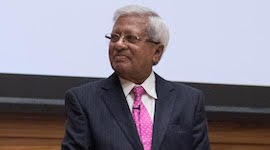
It was 1972 and Bangladesh was “an international basket case.” The Liberation War had just ended and the country was still reeling from the deadliest tropical cyclone ever recorded, Bhola, two years before.
The desperate conditions in his native country convinced Fazle Hasan Abed to quit his executive job at Shell Oil and try to help. But he couldn’t have foreseen the impact he would have on Bangladesh – and the world – when he founded what was originally a short-term relief effort called the Bangladesh Rural Advancement Committee.
That original group of a couple dozen people grew into what is now called BRAC, the largest non-governmental development organization in the world, with a $1 billion budget and 111,000 employees offering services to 138 million people. And Bangladesh, not coincidentally, has transitioned from the world’s second poorest country to lower middle income.
BRAC’s overarching philosophy is that poverty has many causes, so many solutions are needed. The organization provides programs in microfinance, education, health care, job training, empowerment of women, sanitation, agriculture, etc., and owns 16 social enterprises that provide $700 million in revenue. The remaining $300 million in revenue is generated through donations.
Abed – now officially Sir Fazle after being knighted by Queen Elizabeth II – has been called one of the world’s 50 greatest leaders, and was hailed as “a public health hero” when the University of Michigan awarded him one of its most prestigious honors, the Thomas Francis Jr. Medal in Global Public Health, on April 6.
The next day, in a sit-down interview with NextBillion, the 80-year-old talked about his four-decades-and-counting quest to empower the poor.
“The greatest influence on me about people’s lives and poverty was my mother. She was very concerned about poverty and poor people and she tried to help them as much as she could,” he said. “(After starting BRAC) I got to know poverty firsthand in the villages of Bangladesh. I became more aware of the multidimensional aspect of poverty. It’s not just lack of income, it’s lack of opportunities, lack of health care, lack of education. It’s all kinds of deprivation that constitutes poverty. Ultimately, it’s also powerlessness to do something about poverty, how to come out of it.
“In the old days, one used to think that one takes resources to the poor people and distributes them, and they come out of poverty. But we thought you have to involve the poor people themselves in the fight against poverty.”
He said he developed that concept – considered revolutionary in the ’70s – from reading “Pedagogy of the Oppressed” by Brazilian educator Paulo Freire. “Oppressed people have got their own way of thinking about life,” Abed said, “and if you can somehow mobilize them, make them critically aware of their own condition, and get them to act on their own behalf, make them an actor in their own history, then things become much easier.”
Perhaps the best example of Abed and BRAC putting that idea into practice was an oral rehydration therapy (ORT) program aimed at ultra-poor women in Bangladesh starting in the early 1980s. Diarrheal disease, the second leading cause of death in children under age 5, leads to dehydration, but it can treated with a simple mixture of water, sugar and salt known as ORT. Conventional wisdom held that illiterate, uneducated women were incapable of properly mixing and administering ORT, but BRAC taught millions of women from Bangladesh’s slums and villages how to do it. And today Bangladesh’s ORT rates are among the best in the world.
BRAC also pioneered a “graduation model” that empowers the ultra-poor to move from safety net programs to income-earning activities and self-sufficiency.
In the free-ranging video interview below, Abed talks more about BRAC’s future than its illustrious past.
He’s optimistic, for example, about the next generation of businesses that might help support BRAC, highlighted by a transition from a free to paid education model. He believes everyone can afford to pay $10 to $15 a month to ensure their children’s future, so BRAC is “looking into providing quality education for poor people.”
He’s wary of religious fundamentalism. The interview was conducted the day after a secular blogger was hacked to death in Bangladesh – the fourth such incident this year – in an attack attributed to a local chapter of al-Qaeda. Abed said that while “intolerant religion is becoming quite a force in our society,” it hasn’t yet had much of an impact on BRAC’s empowerment efforts, specifically of women, and he hopes such intolerance can be kept under control.
And he’s certain that it is, indeed, possible to eliminate extreme poverty worldwide, in accordance with Sustainable Development Goal No. 1. As one might expect, he’s got a plan in mind:
Inadequate sanitation negatively affects the lives of billions of people in the Base of the Pyramid (BoP) in the developing world, and has a particularly substantial impact on the well-being of millions of young children. Given the magnitude of the challenge and the limitations of existing approaches, enterprise-led approaches to providing public goods are generating growing interest. Emphasizing convergent innovation, enterprises targeting the BoP are presented as potentially sustainable and scalable interventions that generate positive poverty-alleviation effects. Yet our understanding of who is affected, and how, remains limited. To begin to address this gap, we apply a multidimensional framework to an urban-based, sanitation-oriented BoP enterprise, focusing on its poverty-alleviation effects on young children. Our analysis indicates that the enterprise’s effects include changes in capability, economic, and relationship well-being and that these changes can be positive or negative. We also find that the impact varies depending on the role of the stakeholder in the business model and the age of the child. Our results contribute to a better understanding of how to assess the effectiveness of a sanitation intervention and how to evaluate the poverty-alleviation implications of an enterprise-led approach.
Case study on the impact of Sanergy on alleviating poverty on children age eight years and younger. Sanergy builds 250 USD modular sanitation facilities called Fresh Life Toilets (FLTs) in Mukuru, a large slum in Nairobi, Kenya, and sells them to local entrepreneurs for 50,000 Kenyan shillings (KES) or about 588 USD. Franchisees receive business management and operations training from Sanergy and earn revenues by charging customers 3-5 KES (0.04-0.06 USD) per use.
The project “Focusing on the Next Generation: An Exploration of Enterprise Poverty Impacts on Children” consisted of qualitatively assessing the impacts of six inclusive businesses across sectors (sanitation, healthcare, agribusiness, renewable energy, housing) and geographies (Latin America and East Africa) on children ages 0-8 years. Funded by the Bernard Van Leer Foundation (BvLF), WDI conducted semi-structured, in-depth, face-to-face interviews with approximately 170 persons from the Base of the Pyramid (BoP). The project team reviewed data regularly to identify emerging patterns. A variety of key and local stakeholders were interviewed to allow for triangulation of impacts. The data collected was coded and analyzed to make cross-stakeholder comparisons within the business on three areas of well-being: Economic, capability and relationship. WDI also analyzed the data to make cross-business comparisons by area of well-being and by stakeholder (customer, distributor, employee and persons in the broader community that do not engage with the venture). The team developed detailed research case studies on six BoP business models from different sectors and geographies including CEMEX’s Patrimonio Hoy, Sanergy, Honey Care Africa, Solar Aid’s SunnyMoney, Villa Andina and Penda Health. These case studies will be used by BvLF for three main purposes: (1) as part of the BvLF’s efforts to mobilize resources and support a Young Child Venture Fund; (2) to identify social investment opportunities for BvLF; and (3) to influence leaders in the field of social impact investing to include metrics related to young children in their measurement systems. The Honey Care Africa research case study was also developed into a teaching case now available through WDI Publishing. WDI also generated an article that summarizes the findings across the ventures. A version of this summary article was selected as a finalist for the Social Issues in Management Division’s Best Paper Award at the Academy of Management Annual Meeting. Additionally findings from research with Sanergy was published in the Annals of the New York Academy of Sciences.
View report at https://wdi.umich.edu/wp-content/uploads/Child-Impact-Summary-Article-v3.pdf.
View summary article at http://onlinelibrary.wiley.com/doi/10.1111/nyas.12345/abstract.